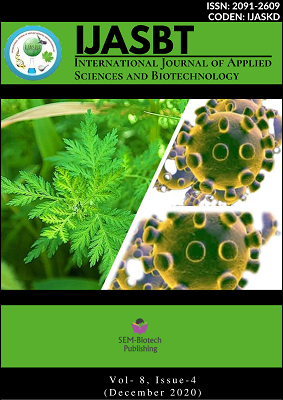Deleterious Effects of Storage Environmental Conditions on The Seed Quality of Two Varieties of Tomato (Solanum lycopersicum L.) Stored in Triple Laminated Aluminum Packing in Sri Lanka
DOI:
https://doi.org/10.3126/ijasbt.v8i4.33670Keywords:
Field emergence, Environmental effects, seed health, seed quality parameters, seed storage, TLAAbstract
Tomato is one of the most commonly growing vegetable crops among the farmers in Sri Lanka. Standard laboratory germination of tomato seeds fulfills the regulatory requirements of seed marketing. However, poor field performance is an overwhelming problem to farmers. Present study was focused on the longevity of two varieties of tomato seeds as affected by their quality characters (percentage germination, moisture, field emergence and vigour index, seed protein and carbohydrate contents) including seed health (exposure of Clavibacter michiganensis subsp. Michiganensis (CMMV), Spotted wilt virus (TSWV) and Leaf curly top virus (LCTV)) under four different storage environmental conditions during a one-year long storage study. Seeds were packed in triple-laminated aluminum packets (TLA) and stored in low temperature storage conditions (17±1 °C and 65% RH) and in ambient conditions in Gannoruwa, Kundasale, and MahaIlluppallama that represent the three agro-ecologically zones; Mid Country Wet Zone (MCWZ), Mid Country Intermediate Zone (MCIZ) and Low Country Dry Zone (LCDZ) respectively. Seed quality parameters displayed varied responses depending on the variety. Physiological changes that occur in seeds due to temperature, RH, changes in proteins and carbohydrate content, CMMV and TSWV during storage were manifested as reduction in seed germination, field emergence and vigour index. However, none of the seedling carried LCTV and therefore its effect on seed quality parameters could not be assessed. The seeds could be stored for ca. 29 months at low and constant temperatures and RH conditions without compromising local seed germination standards compared to ambient storage in the three environments. CMMV and TSWV detected in all seed samples indicated potential threats to tomato farmers in Sri Lanka.




